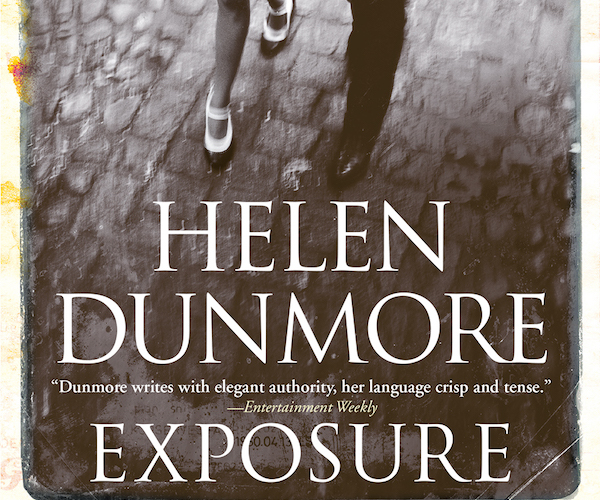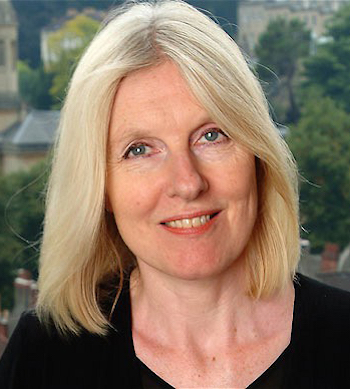Book Review: Helen Dunmore’s Terrific “Exposure”
There are resemblances to Virginia Woolf not only in the terrific prose but also in Helen Dunmore’s awareness that much of family life lies in what is not said as much as in what is said.
Exposure by Helen Dunmore. Atlantic Monthly Press, 400 pages, $25.

By Roberta Silman
Back in September of 2012 I reviewed Helen Dunmore’s novel The Greatcoat for The Arts Fuse. Although Dunmore had garnered several awards by then and it was clear that she is a very talented writer, I thought that novel too schematic and felt that her fine prose was overcome by an idea that didn’t work for me and that, in the end, didn’t really work for her.
But now, I am happy to report, she has written a fabulous, riveting novel called Exposure, set in London in 1960 — a novel in which her interest in history and world events work gracefully with her unique gifts for both the telling detail and the ability to build dramatic tension.
Although at first you think you are in the middle of a thriller — and in some ways you are — and although fear propels a good deal of the action in this book, Dunmore has also created an unforgettable family whose ties are strong enough to endure what might have defeated most of us. Whose members grow and change with a kind of fortitude rarely depicted in the modern novel. There are resemblances to Virginia Woolf not only in the terrific prose but also in Dunmore’s awareness that much of family life lies in what is not said as much as in what is said. And, more specifically, there is E. Nesbit’s The Railway Children hovering closely in the background as we become immersed in the story of Simon and Lily Callington and their three children, the eldest of whom, Paul, is obsessed with all things to do with trains.
The Callingtons live in Muswell Hill, Simon works for the Admiralty, Lily teaches French, Paul is eleven, Sally ten and Bridget almost five. After the newspapers reveal that Simon has been arrested for being a traitor, a neighbor says, “They seemed like a nice family.” And they are. Simon comes from an obnoxious posh family up north but does not have to depend on them, thank God. Lily was born Lili Brand in Berlin but she and her parents escaped the Holocaust; her father is now in Morocco and her mother lives not far away in Brighton. And although Simon has had a privileged past, he has never been ambitious. “He didn’t want to do well and make his mark. He wanted to live peacefully and privately far away from Stopstone, Norfolk [his family home], the World, the Universe and all that. Not wanting things made you free.”
But before there was the cozy house in Muswell Hill there was the past including Simon’s youthful fling with Giles Holloway while he was at Cambridge and Lily’s childhood as a small German/Jewish girl living in Berlin as Hitler rises to power. Pasts which will figure prominently in the unfolding of this novel and will determine its outcome.
When Simon gets a phone call from Giles asking a favor, everything changes. A man who always lives on the edge, Giles has taken home a file that should never have left The Admiralty; instead of being able to return it the next morning as he planned, he has fallen down the stairs and is now in hospital. All he wants is for Simon to retrieve it and get it back where it belongs. “Easy-Peasy,” he says. But not so easy. His carelessness sets off a chain of events that leads us into the world of Guy Burgess and Kim Philby and Donald Maclean, the words Top Secret and Brits masking Russian connections. Not at all what Simon ever wanted. In a panic he thrusts the briefcase containing the file into the back of the front closet, where Lily finds it and buries it. With not a word between them, because all they want is for things to remain the same, peaceful and quiet and normal.

Author Helen Dunmore
No review should be a spoiler for a book like Exposure because part of the pleasure of reading is seeing an intricate story play out in an almost seamless way. Dunmore moves from present to past with uncommon ease; she also moves from one point of view to another with elegance and authority, proving that there are no rules in writing fiction, only what you can do convincingly. And we are absolutely convinced by this story, which, in the end turns out to be a triumph for the Callingtons because of Lily’s tenacity and courage and need to keep her beloved family together.
On the way, though, there are many obstacles, practical ones like how are they going to live without Simon’s salary, will she be able to keep her job, how will the children cope when their father’s case is revealed, and the equally important questions about how they got into this mess, the truth of Simon’s past, and the baggage of insecurity that Lily knows she has. Not long after Giles’s phone call, Lily senses how aware the children are:
They are face to face now, locked, staring. Around her she feels the children’s silence. They sit as still as hares on the carpet. They know. Just as she always knew. When her parents talked together, all those frightening words. She listened while she pretended to read or to play….
‘You might be going on your travels, Lili! Just you and Mama. To England, right across the sea. How would you like that?’…
Now her parents were afraid, and she soaked in their fear through the pores of her skin. People think children know nothing, that they forget, that they don’t feel things. But she knew everything….
And later, when the enormity of what has happened finally hits the children and Paul and Sally are talking:
‘He’s in prison,” says Sally. It is the first time she has ever said those words aloud… [and] she understands that she longer believes Dad will be back soon, next week or the week after or at the very worst the week after that. …
‘Do you think,’ Sally asks, colouring again, ‘it could be that Mum doesn’t know things because of not being born here?’
That thought has come to Paul too, but he hasn’t dared shape it into words. It makes him angry with Mum, and protective too, as if she’s the child, not him. But he doesn’t want Sal looking so scared.
‘No,’ he says. ‘Mum’s just the same as if she was English.’
Besides these remarkable children, there are friends and colleagues, lawyers and cops and reporters, and Dunmore brings them deftly into the mix so that we know exactly what Lily is going through as she discovers how independent and proud she really is. We also watch Simon becoming a husband and father in ways he never knew how to be before he found himself in prison. And, as a counterpoint to the Callingtons’ story, there is Giles Holloway’s illness and eventual death. Characters like Giles have become a Cold War cliché in the England of the 1960s, yet in Dunmore’s hands we see a man who prided himself in his hedonism and never thought about death facing it with unexpected dignity.
In the Prologue which is, chronologically, the end, Simon realizes:
It isn’t what you know or don’t know: it’s what you allow yourself to know… It turns out that I knew everything. All the facts were in my head and always had been. I ignored them because it was easier. I didn’t want to make connections. I’ve begun to understand that I’ve been half-asleep all my life, and now I’m waking up.
It is also what you are capable of. Simon and Lily and the three children are more resilient than they ever imagined. Perhaps even more than Dunmore herself imagined when she began this novel. For one of the pleasures of Exposure is watching what could be a sour tale of the English bureaucracy during the Cold War crushing a family become a luminous story of courage and forgiveness — in itself a kind of bravery — where events from the past are accepted and put in their proper place. Where even brutal memories of enduring cruelty at the hands of Simon’s brothers or their neighbors in Berlin can somehow strengthen instead of defeat. Where the burdens of the past are overcome by good sense and compassion and the primitive need to survive. Where the future is earned in ways that confront reality and deal with it, yet also affirm life and our capacity for love.
And just in time for Mother’s Day! How lucky is that?
Roberta Silman‘s three novels—Boundaries, The Dream Dredger, and Beginning the World Again—have been distributed by Open Road as ebooks, books on demand, and are now on audible.com. She has also written the short story collection, Blood Relations, and a children’s book, Somebody Else’s Child. A recipient of Guggenheim and National Endowment for the Arts Fellowships, she has published reviews in The New York Times and The Boston Globe, and writes regularly for The Arts Fuse. She can be reached at rsilman@verizon.net.
